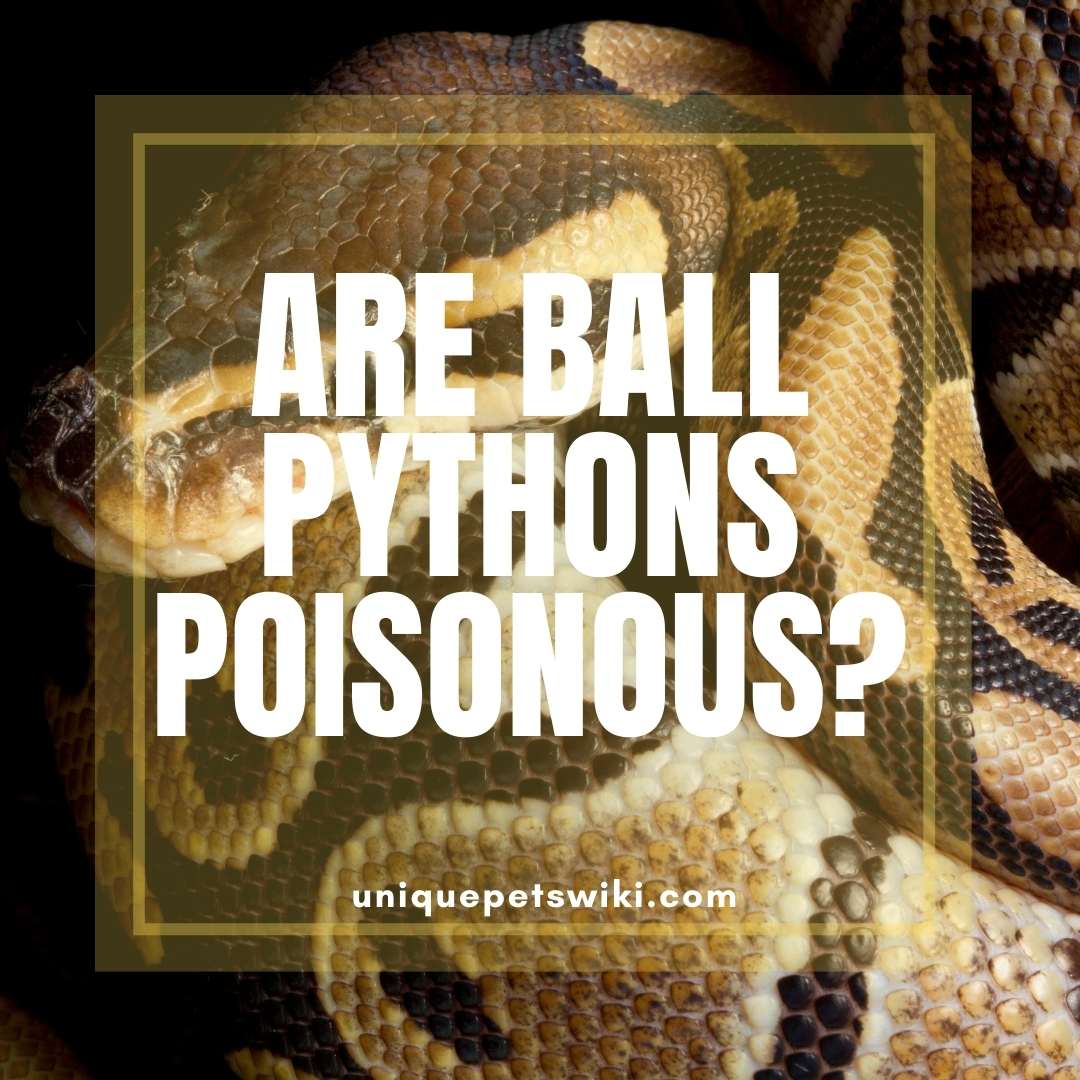Ball pythons snakes are one of the most common snake pets across the world. You have probably done your research, and you are certain about buying one for a pet.
But before even introducing a ball python into your home, are ball pythons poisonous?
Well, if you would like to know the answer to this question, keep reading this article. In this article, you will know if these serpents are poisonous and understand their hunting behavior.
Contents
Are Ball Pythons Poisonous?
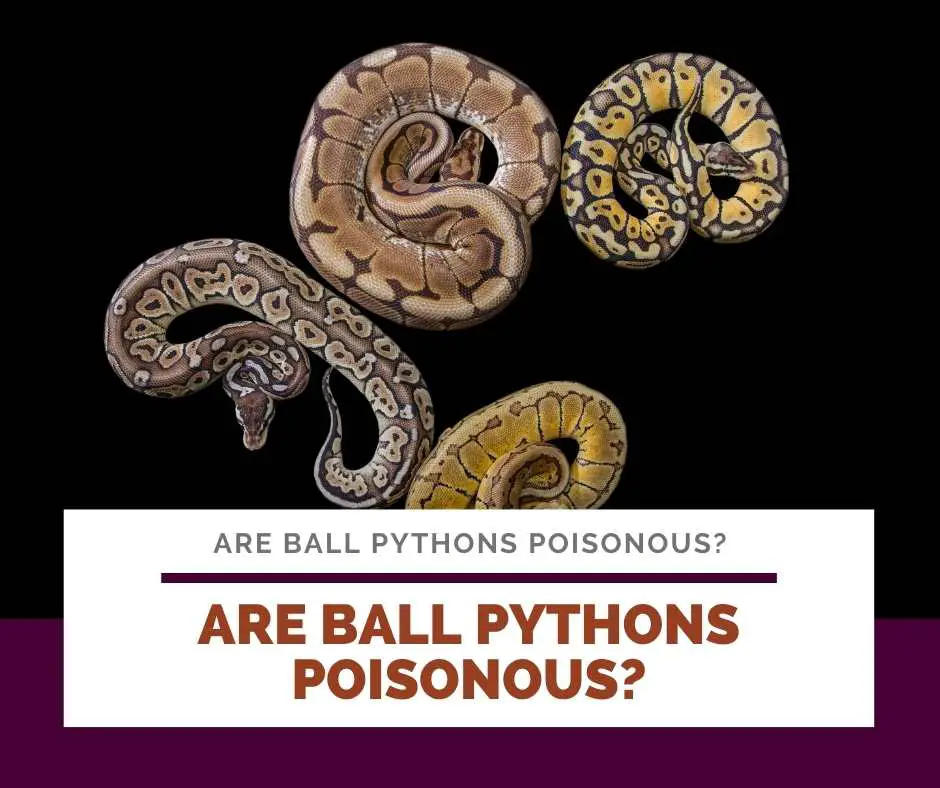
No, ball pythons are not poisonous, and neither are they venomous. Instead of biting, ball pythons are typically constrictors that kill their prey by squeezing. They quickly strike their victim, immobilizing it, and then constricting the prey till they die.
There are approximately 26 species of pythons, among them ball pythons. Ball pythons are the smallest in their family. They grow to an approximate length of 3-5 feet.
Thus, in most cases, pythons are not harmful to humans. Actually, ball pythons are not even big enough to pose a threat to humans.
In fact, ball pythons feed on small rodents. Even though ball pythons have four rows of teeth, they use them to grip the prey and prevent it from escaping.
How Ball Pythons Kill their Preys
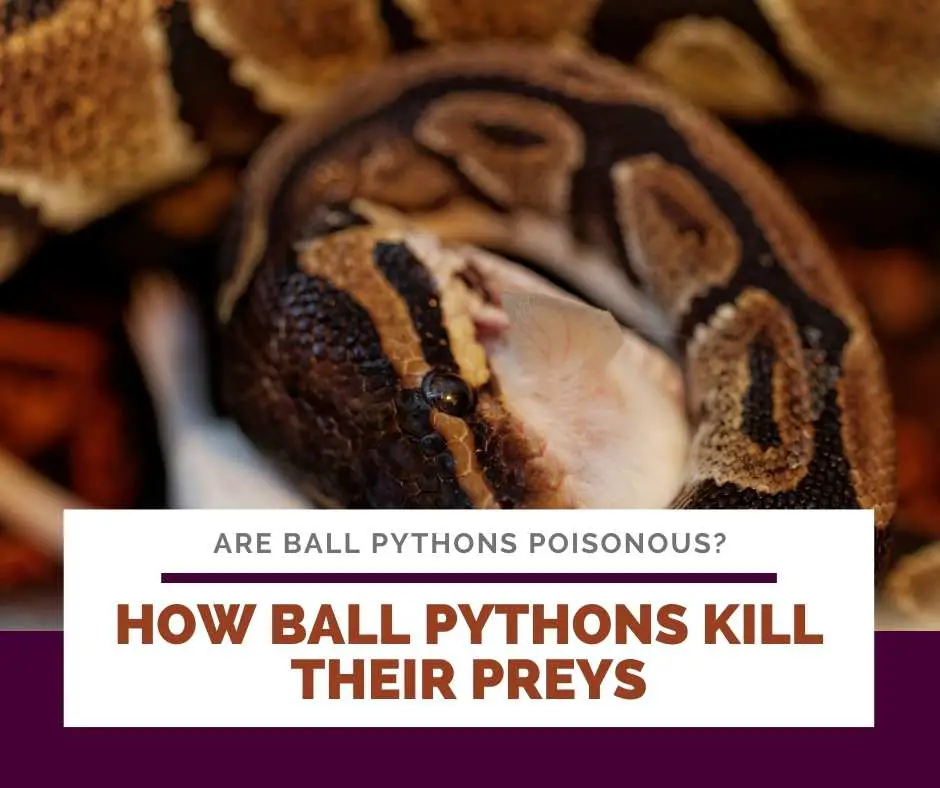
Ball pythons belong to the constrictors’ family. As such, they only kill their prey by suffocating it to death before swallowing it.
Before grabbing their prey, ball pythons quickly strike their prey and then coil around, squeezing it to death.
Ball pythons can sense their victims breathing motions. Thus, ball pythons add a grip on every breath of their victim until there’s none left.
According to scientific research when constrictors coil on the victim’s body and squeeze, the blood pressure drops to half in 6 seconds.
Then, the heartbeat also drops to half in a minute. Thus, the ball pythons do not kill their prey by suffocating as commonly perceived.
Instead, the prey dies from the dropped blood pressure that makes the heart stop beating.
Understand Ball Python Behavior
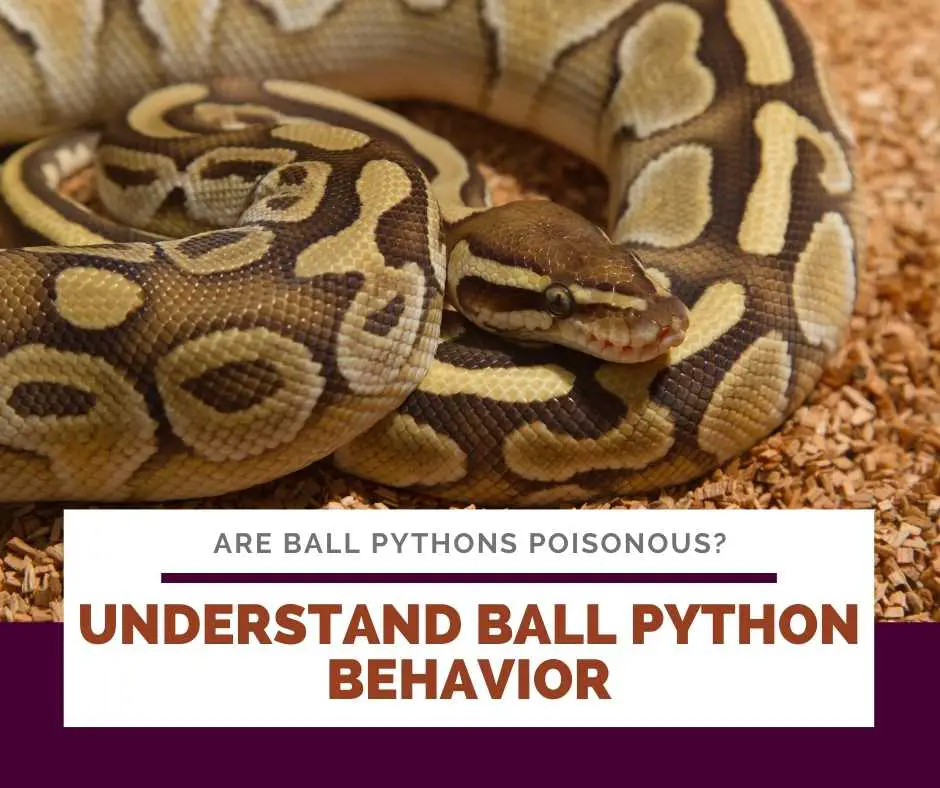
Ball pythons are social snakes, and they are typically docile. They are also lazy and do not try to attack. However, when they are hungry, they can try to eat anything that comes along.
Ball Pythons Do Not Attack Unless Hungry
It is unusual for ball pythons or other constricting snakes to attack without reason. They do not like to waste their energy on anything that is not food.
Before trying to attack, constricting snakes prefer to either bite or exit the area rather than strangle non-food creatures.
Though ball pythons are not as playful as dogs, they enjoy wrapping around the arm or the waist.
Generally, snakes are not frequent eaters. Snakes can even go for six months without eating. However, when they are extremely hungry, they can try to eat whatever is available even if it’s too big to kill the snake.
One reason why snakes can go for long without eating is that they can shrink their gut to nothing. Shrinking the gut helps them to reserve energy used to create enzymes.
However, when the snake consumes a large meal, the snakes have to use quite a significant energy to grow the gut back.
Did you know that according to abc.com, snakes use about 45 times more energy than the regular amount to precede a new meal?
The good news is, a ball python can never kill you by constriction as they don’t even ever grow big enough for that.
However, other pythons such as Burmese, African rock, and reticulated are large enough to kill humans by constriction.
Are Pythons Dangerous to Humans?
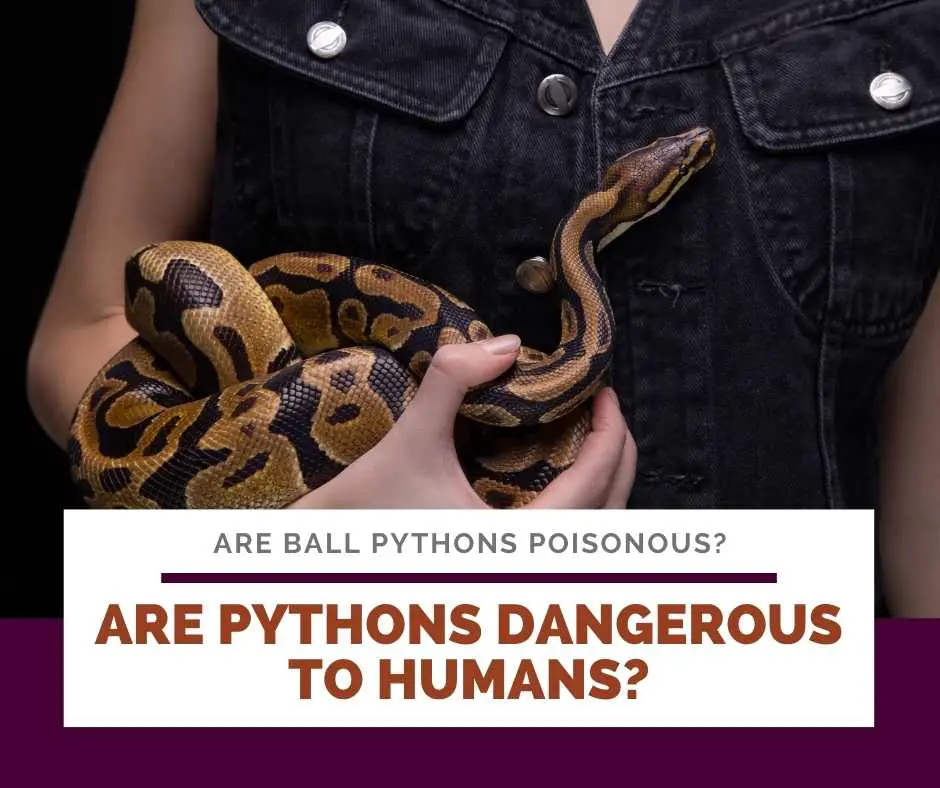
Even though pythons are non-venomous, they can still be harmful to humans. In fact, some of python’s species can be deadly.
However, as for the ball pythons, they are too small to harm humans. Some of the most dangerous pythons include
- Burmese Pythons
- African rock pythons
- Indian pythons
- Reticulated pythons
Burmese Pythons
The Burmese python can get quite large. It belongs to the five largest snakes in the world. They can grow up to 30feet long.
They are, therefore, not suitable pet snakes as they pose a threat to humans.
Burmese pythons are commonly found in Southeast Asia. However, you can find them elsewhere as invasive species.
African Rock
The 20feet long snake is a native habitat of sub-Saharan Africa. They are ill-tempered and thus not good for a pet snake.
African rock is famous for strangling two boys to death after escaping its enclosure via the ceiling.
Indian Pythons
Indian pythons are large non-venomous pythons found in Southeast Asia. These snakes can grow up to 9.4 feet.
Even though they are timid and can rarely attack, they do not make good pets because of their size.
Indian pythons mainly inhabit forests and woodlands.
Reticulated Pythons
Reticulated pythons are also among the largest snakes in the world. They can grow to a maximum length of 20 feet.
They are non-venomous and typically docile. However, reticulated pythons are large enough to constrict humans.
Thus, these snakes do not make good snake pets either.
Can Pythons Kill Humans?
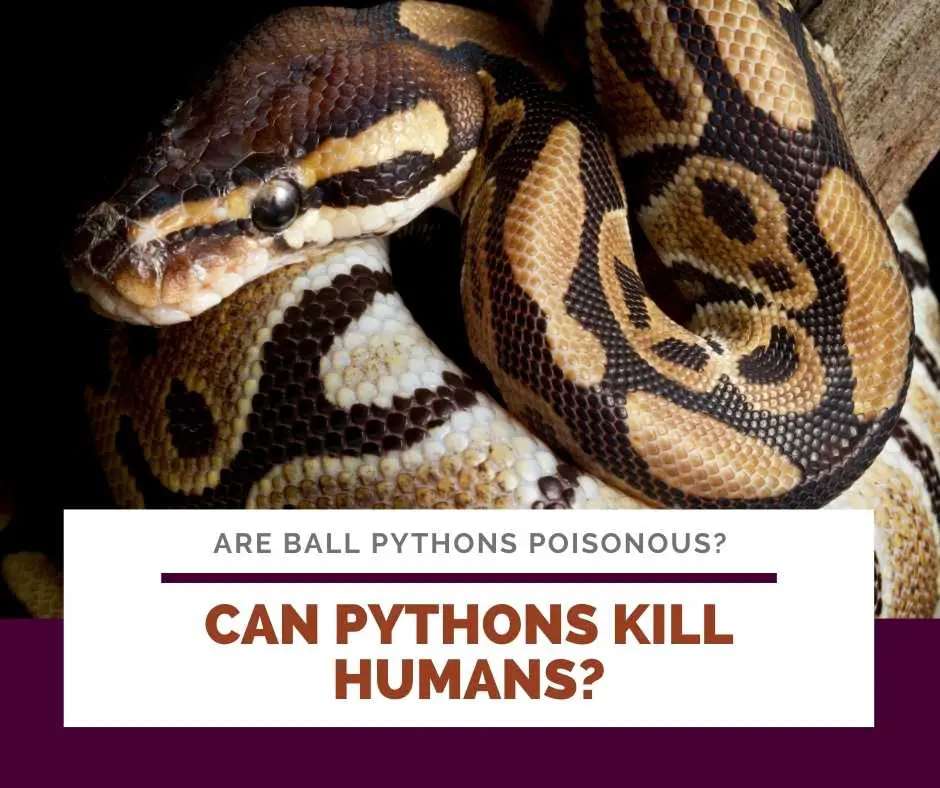
Yes, pythons can kill humans even though they are non-venomous. However, it depends on the python species.
Some of the pythons that have been known to kill humans include;
- African Rock
- Burmese pythons
Large pythons are inadvisable to keep as pets. It is because sometimes they have been known to attack their keeper and some even kill them.
Pro Tip: How to Tame & Handle Ball Pythons for the First Time Owners
If it is your first time to own a snake, it is necessary to understand how to tame and handle your pet.
It is because snake pets, including ball python, can be irritable sometimes and even try to bite you.
Thus, before handling your ball python pet, here are some tips to help you tame and handle it well, even if you are a first-time snake pet owner.
Respect your pet
The first step to tame your ball python snake pet is by giving it time to get used to its new environment.
Snakes can get stressed when introduced to new habitats. Thus, it is inadvisable to handle them immediately after bringing them into their new home.
Gains its Trust
The second step before handling your snake pet is by trying to gain its trust. You can regularly visit its cage to feed it without handling it.
Then you can introduce small sessions of handling until your snake gets comfortable around you.
Don’t Handle It Before or After Feeding.
Ball pythons can try to bite you if they are extremely hungry. They can also get stressed if you handle them immediately after feeding.
Therefore, you should avoid handling your ball python before and after feeding.
Pro tip: you should always wash your hands after handling snakes. Snakes carry salmonella bacteria that can be transferred to you. Therefore, it is important to keep your snake’s cage clean and disinfected.
Wrapping Up
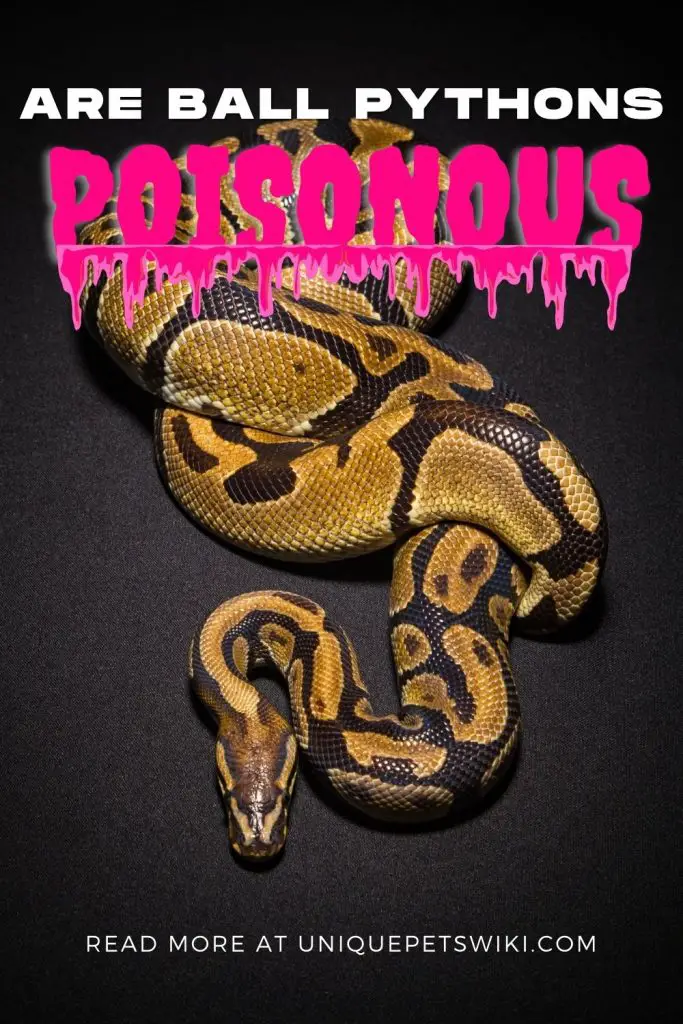
Ball pythons are docile and social snake pets. They are the safest snake pets you can own. However, they can still bite you if they feel threatened or stressed.
Therefore, it is important to understand your ball python’s mood and behavior. It would also help if you took extra caution by ensuring that your ball python is in a closed enclosure that they cannot escape.
